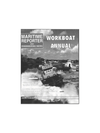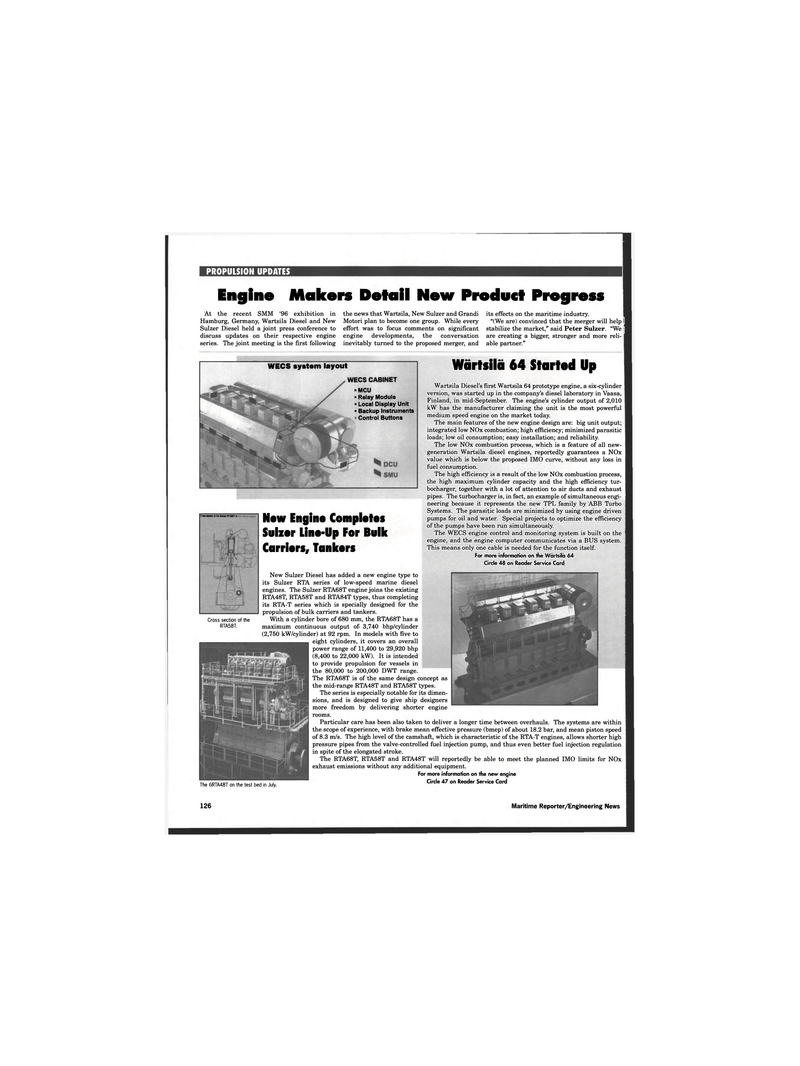
Page 124: of Maritime Reporter Magazine (November 1996)
Read this page in Pdf, Flash or Html5 edition of November 1996 Maritime Reporter Magazine
PROPULSION UPDATES
Engine Makers Detail New Product Progress
At the recent SMM '96 exhibition in
Hamburg, Germany, Wartsila Diesel and New
Sulzer Diesel held a joint press conference to discuss updates on their respective engine series. The joint meeting is the first following the news that Wartsila, New Sulzer and Grandi
Motori plan to become one group. While every effort was to focus comments on significant engine developments, the conversation inevitably turned to the proposed merger, and its effects on the maritime industry. "(We are) convinced that the merger will help I stabilize the market," said Peter Sulzer. "We | are creating a bigger, stronger and more reli- able partner."
WECS system layout
WECS CABINET •MCU • Relay Module • Local Display Unit • Backup Instruments
Control Buttons
SroM-wxJion of fts Suttw RT«0Tn New Engine Completes
Sulzer Line-Up For Bulk
Carriers, Tankers
Wartsila 64 Started Up
Wartsila Diesel's first Wartsila 64 prototype engine, a six-cylinder version, was started up in the company's diesel laboratory in Vaasa,
Finland, in mid-September. The engine's cylinder output of 2,010 kW has the manufacturer claiming the unit is the most powerful medium speed engine on the market today.
The main features of the new engine design are: big unit output; integrated low NOx combustion; high efficiency; minimized parasitic loads; low oil consumption; easy installation; and reliability.
The low NOx combustion process, which is a feature of all new- generation Wartsila diesel engines, reportedly guarantees a NOx value which is below the proposed IMO curve, without any loss in fuel consumption.
The high efficiency is a result of the low NOx combustion process, the high maximum cylinder capacity and the high efficiency tur- bocharger, together with a lot of attention to air ducts and exhaust pipes. The turbocharger is, in fact, an example of simultaneous engi- neering because it represents the new TPL family by ABB Turbo
Systems. The parasitic loads are minimized by using engine driven pumps for oil and water. Special projects to optimize the efficiency of the pumps have been run simultaneously.
The WECS engine control and monitoring system is built on the engine, and the engine computer communicates via a BUS system.
This means only one cable is needed for the function itself.
For more information on the Wartsila 64
Circle 48 on Reader Service Card
Cross section of the
RTA58T.
The 6RTA48T on the test bed in July.
New Sulzer Diesel has added a new engine type to its Sulzer RTA series of low-speed marine diesel engines. The Sulzer RTA68T engine joins the existing
RTA48T, RTA58T and RTA84T types, thus completing its RTA-T series which is specially designed for the propulsion of bulk carriers and tankers.
With a cylinder bore of 680 mm, the RTA68T has a maximum continuous output of 3,740 bhp/cylinder (2,750 kW/cylinder) at 92 rpm. In models with five to eight cylinders, it covers an overall power range of 11,400 to 29,920 bhp (8,400 to 22,000 kW). It is intended to provide propulsion for vessels in the 80,000 to 200,000 DWT range.
The RTA68T is of the same design concept as the mid-range RTA48T and RTA58T types.
The series is especially notable for its dimen- sions, and is designed to give ship designers more freedom by delivering shorter engine rooms.
Particular care has been also taken to deliver a longer time between overhauls. The systems are within the scope of experience, with brake mean effective pressure (bmep) of about 18.2 bar, and mean piston speed of 8.3 m/s. The high level of the camshaft, which is characteristic of the RTA-T engines, allows shorter high pressure pipes from the valve-controlled fuel injection pump, and thus even better fuel injection regulation in spite of the elongated stroke.
The RTA68T, RTA58T and RTA48T will reportedly be able to meet the planned IMO limits for NOx exhaust emissions without any additional equipment.
For more information on the new engine
Circle 47 on Reader Service Card 126 Maritime Reporter/Engineering News

 123
123

 125
125
